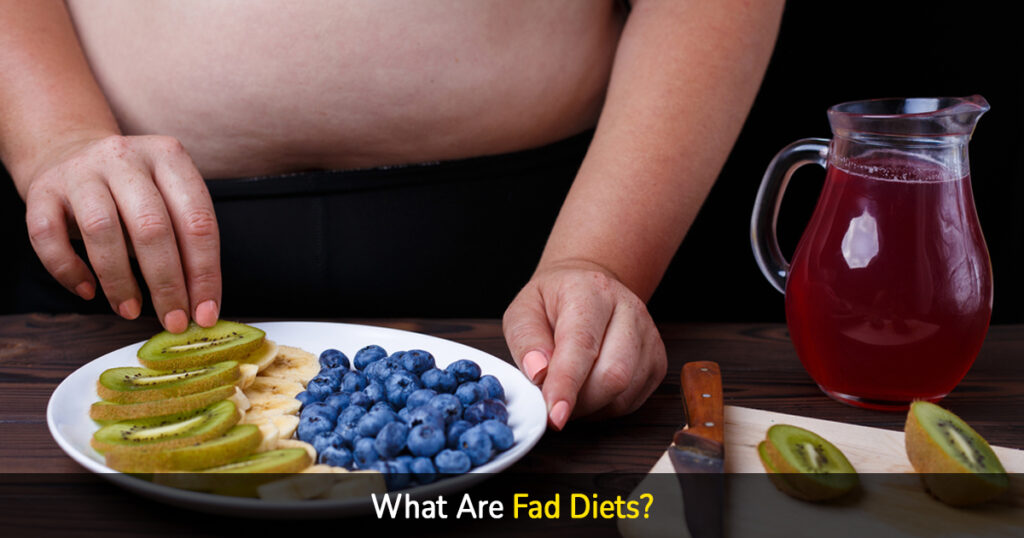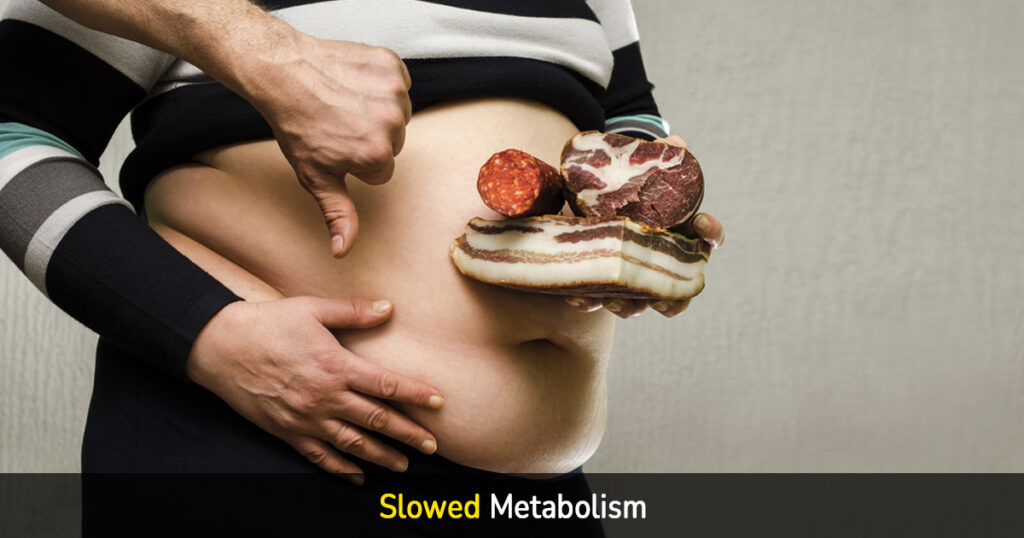You’ll find all sorts of weight loss promises online, like “miracle” 7-day plans, no-carb rules, and detox teas. We often jump on the bandwagon with fad diets because they lure us in with the promise of simple steps and quick results. The caveat, though, is that quick solutions are seldom permanent.
What Are Fad Diets?

Trendy eating programs that claim to help you lose weight quickly with no effort are known as fad diets. They frequently advocate for quick-fix items, severely limit caloric intake, or exclude entire food groups from their diet. Although you may experience temporary weight loss, it is frequently difficult to sustain these diets due to their restricted nature, and the weight usually returns once you resume your old eating habits.
The following are some hallmarks of fad diets:
- Lose 10 pounds in 7 days!” is a quick fix.
- No carbohydrates Ever.
- Endorsements from famous people: Spread via advertising rather than research.
- A lack of long-term planning for maintenance following the diet is a short-term concern.
The rapid weight loss you may experience on these diets is actually water or muscle loss rather than fat. The return to unhealthy eating and other habits is a common consequence of dieting.
The fundamental problem with trendy eating plans is that they don’t work in the real world. Reason number one for their failure:
1- Too Restrictive

Too rigid of a diet is one of the key reasons why fads come and go. Eliminating entire food groups, such as carbohydrates, dairy, or fats, may provide short-term benefits, but it becomes challenging to sustain in the long run. Intense cravings, feelings of helplessness, and, when the constraints become too much to bear, binge eating are common outcomes of this type of severe dieting. A method that is more sustainable allows for moderation and flexibility rather than outright bans items that you enjoy. This helps you develop a healthier connection with food and supports long-term weight loss.
2- Nutrient Imbalances

Due to their extreme calorie restriction or elimination of whole food groups, many fad diets induce nutritional deficiencies. Extremely low-fat diets may remove beneficial lipids that maintain hormone balance and cognitive function, while low-carb regimens might deplete your body of fiber and other vitamins. Fatigue, compromised immunity, and even chronic health problems might develop from these inadequacies with time. In order to get long-term health benefits rather than merely a temporary reduction in body fat, it is important to follow a diet plan that includes a wide range of nutrients derived from whole foods.
3- Slowed Metabolism

Many fad diets have the unintended consequence of lowering your metabolism. If you severely limit your caloric intake, your body may enter a “survival mode,” where it burns fewer calories to preserve energy. The short-term benefits of this include reduced appetite and weight loss may be more noticeable, but the long-term effects include a greater likelihood of regaining lost weight once eating habits return to normal. A better strategy is to eat enough healthy food to keep your metabolism going, along with regular exercise, so that your weight reduction is consistent and long-lasting rather than rapid and dangerous.
4- The Yo-Yo Effect

The yo-yo effect is a typical problem with fad diets, wherein people lose weight rapidly but then put it all back on again. Many individuals are unable to maintain these diets over the long run due to their extreme restriction. Many people find that the pounds they lost (and sometimes even more) come back once they get back to their regular eating habits. Losing weight and then gaining it all back again is discouraging and might slow down your metabolism, making it even more difficult to lose weight in the future. Contrarily, sustainable behaviors including eating a balanced diet, controlling portion sizes, and exercising regularly allow you to keep your results without experiencing the ups and downs of dieting.
Sustainable Weight Loss: A Better Choice than Fad Diets
Sustainable weight loss, as contrast to fad diets, emphasizes small, manageable improvements that one can maintain indefinitely. This approach really values balance and consistency more than strict rules.
Foundational elements of long-term weight reduction comprise:
1. Balanced Nutrition

The absence of nutritional balance is a major danger of crash diets. Many of these popular diets promise rapid weight loss by eliminating certain food groups from your diet, such as carbohydrates, fats, or even entire fruit and vegetable categories. Although this may result in temporary weight loss, it frequently causes a lack of essential nutrients, fatigue, and hunger pangs, which make sticking to the diet difficult. For optimal bodily function, a well-balanced diet should consist of a wide variety of foods, such as whole grains, lean proteins, healthy fats, and an abundance of fruits and vegetables.
2. Portion control

Most fad diets tend to ignore portion control, instead focusing on strict rules or completely cutting out certain foods. The catch is that it’s easy to revert to overeating once the diet is finished if you don’t learn portion control. Rather than eliminating entire food groups, practicing balanced portion control teaches you to eat all foods in moderation. Fad diets don’t usually encourage a balanced way of eating, but focusing on portion sizes and listening to your body’s hunger signals can definitely make a difference.
3. Regular activity

Regular physical activity is often overlooked in fad diets, despite its importance for weight management and general health. While crash dieting may lead to short-term success, maintaining a healthy weight requires a combination of a balanced diet and regular physical exercise, such as walking, strength training, or even dancing, to burn calories more efficiently and sustain benefits over the long run. Making exercise a regular part of your life increases strength, increases energy, and keeps your metabolism active, making long-term weight loss much more attainable than with fad diets, which typically emphasize short-term remedies.
4. Consistency over perfection

In order to see benefits from a fad diet, you are led to believe that you must adhere to strict guidelines to the letter. However, in order to achieve lasting success, perfection is unattainable. Maintaining a healthy routine over time is more important than skipping a workout or indulging in a cheat meal every now and then. In contrast to the unrealistic all-or-nothing mentality of fad diets, sustainable weight loss is based on consistent decisions like healthy eating, portion control, and exercise. A more adaptable, pleasurable, and fruitful way of life can be yours if you set your sights on improvement rather than perfection.
Aiming for 1-2 pounds of weight loss every week is both safe and more likely to stay, according to the Centers for Disease Control and Prevention (CDC).
Tips to Avoid Falling for Fad Diets

If you are uncertain about the veracity of a diet plan, consider the following questions:
- Does it guarantee immediate and significant outcomes?
- Is the elimination of certain food groups necessary?
- Is the “secret” to success based on pills, teas, or shakes?
- Does it rely more on anecdotes than evidence from studies?
If you answered “yes” to most of these questions, you’re probably looking at a fad diet.
The Bottom Line
Although fad diets promise quick weight loss, they do not lead to long-term health benefits. Achieving and maintaining healthy habits, such as eating well, exercising regularly, and being consistent, are the keys to long-term weight loss success. Although it lacks the glitz of the newest viral cleanse, it is the only method that delivers lasting results.

